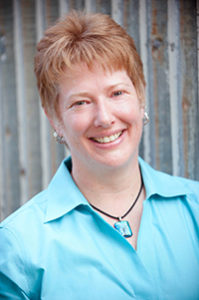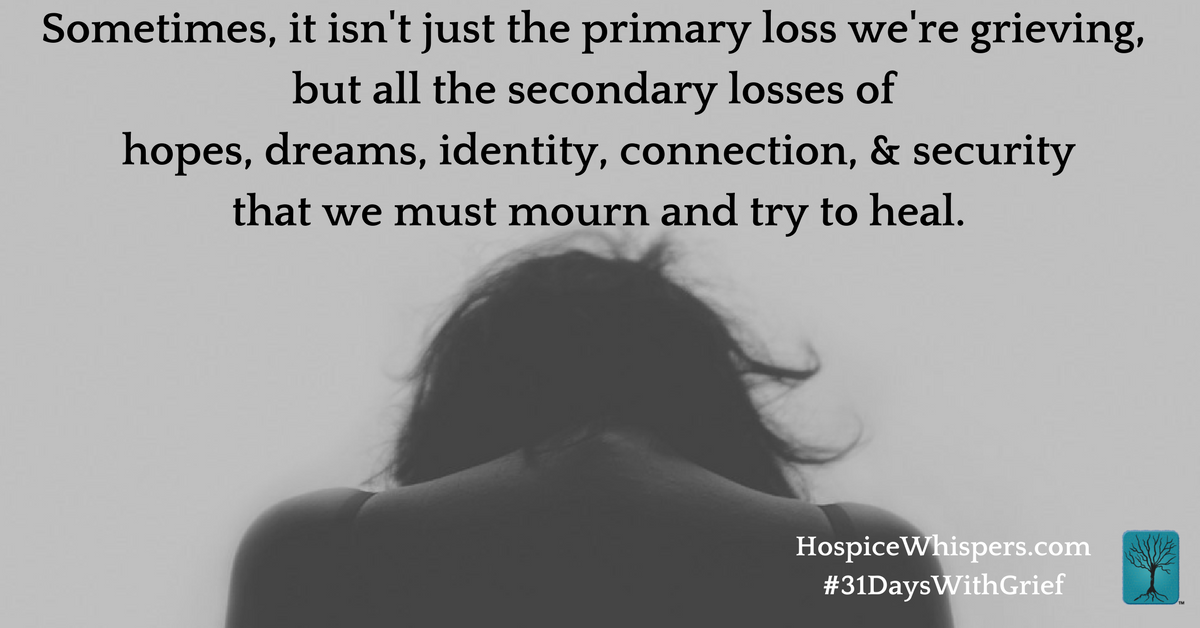31 Days of Walking with Grief: Others’ and Our Own
Day 21—Primary and Secondary Losses
This is a month-long series to support persons grieving and those who love them. It includes content from “Sharing Our Stories: A Hospice Whispers Grief Support Workbook” available through Amazon and wherever books are sold.
“So much of my time, energy, and identity has been wrapped up in being an architect. After my injury, I’m legally blind and can’t see to do the work that’s been my life’s calling, and I was GOOD at it. Who am I, now? How do I adjust to suddenly not going into work every day with my colleagues who are also my friends? Who am I now that I’m not the breadwinner and provider? How do I feel like I’m taking care of my family, now?”
“So much of my time, energy, and identity has been wrapped up in being Evelyn’s son. Caring for her after dad died and after her stroke has consumed our lives. Though we were tired, the family of folks here at this facility are now part of our everyday routine. My wife comes on the way to work to say hello and bring her laundry. I come and help her eat lunch and visit with the staff and her friends, and we come 3 nights a week to watch television and listen to music with her and the other residents and even their families. This is our second living room. We all supported each other. I don’t know how to say goodbye to not just her, but this whole community of people we’ve come to love. Where am I supposed to eat lunch during my break? It’s just so weird to lose it all at once.”
“So much of my time, energy, and identity was wrapped up in being Scotty’s mother. Now that he’s dead, I don’t know who I am any more. My nest isn’t supposed to be empty, yet and, when he did leave, it was supposed to be to go excitedly to college and figure out who he wanted to be, to fall in love and find his life’s passion in his work. Then I could watch proudly from the sidelines and cheer him on. He was supposed to have children and I was supposed to get to see him be the fabulous father and spouse I knew he would be, and I would adore the person he loved and their babies were supposed to come and fill the empty space on my lap. Now ALL of that’s gone.
When we experience a loss of any sort, it usually involves not just the primary loss of the thing, ability, relationship, or person we’re grieving but also the secondary losses of identity, routine, security, provision, and so much more.
We often do not recognize these secondary losses and realize their impact until they are already sorely felt. Others around us also fail to notice them and therefore forget to care for that part of our grief, as well. Because they don’t quite get it, they may not be as sensitive to these secondary losses as is deserved, so we can feel even more isolation and shame.
Caring professionals are, or should be, trained to predict and notice these secondary losses and help persons prepare for and cope with them. When I ask the questions, “What are you going to miss the most about your dad when the time comes that he does die?”, I’m not just inviting them to process their grief, but listening for cues as to the secondary losses they are going to experience.
So often, loved ones respond that they are going to miss just being able to pick up the phone and call them. Those grieving often tell me how many times they pick up the phone or think, “Oh, I need to tell mom about that, she’ll love it!” just to realize she’s not there to call anymore.
Many of us have a routine; we call her every Sunday afternoon and Thursday evening to check in and visit every other Tuesday when we take a half day off work. Or we have an empty seat at the table we aren’t sure what to do with. And what about their things?
One woman woke up, made coffee, and cooked eggs. “I was fixing two plates before I realized, he’s not coming downstairs to join me for breakfast anymore.”
We help persons think through what routine they want to adopt next. What have they wished they had time for but did not? What’s on THEIR bucket list? How could they perhaps honor the memory of their loved one by picking up something that would carry on their legacy?
Who is that loving friend who will agree to take a phone call every Sunday afternoon, Thursday evening, and have lunch every other Tuesday to listen to you tell stories about mom until you find a new normal in your life?
Who is willing to be your new “go to” person to call for a while to feel connected and share good news or when you’ve had a bad day or just need to pick up the phone and call?
Without skipping over your grief with busyness, how about taking that art class or joining the choir or signing up to be a reading mentor at a local school?
The goal isn’t to replace or forget about the person or relationship or ability or thing you’ve lost, but to find some sense of meaning for yourself, perhaps even in a way that helps you remain connected to what’s been lost.
“Mom was a teacher. She would like that I’m helping kids read.”
“My son loved nature. Volunteering at the community garden helps me help others enjoy what he most loved.”
“We used to dance wherever and whenever, just for the heck of it, before I found out about the affair and we divorced. I signed up for dance lessons. He’s taken enough. He doesn’t get to take that away from me, too.”
And the man who was an accomplished architect? His colleagues dragged him kicking and screaming into teaching, and he wound up loving every second of it for two more decades!
You’re not filling up a hole, you’re filling up your life. You’re not replacing them, you’re finding a way to find meaning in the midst of your loss and maybe even connect with them, or yourself, in a new and different way.
Whatever you choose to do, find ways to acknowledge what else has been lost and find others to be sensitive to these secondary losses. Grieve them, care for them, and find ways to heal them in time. As overwhelming and impossible as it may seem, there is still hope for finding a new normal, perhaps one you never wanted, but maybe one that contains joy in ways you never could have imagined.
Peace,
Carla
 Rev. Carla Cheatham, MA, MDiv, PhD, TRT has served hospices as a chaplain and bereavement coordinator. She’s the Section Leader for the Spiritual Caregivers Section of the National Hospice and Palliative Care Organization and an adjunct professor at the Seminary of the Southwest. Through her Carla Cheatham Consulting Group, Carla provides training and consulting for professional caregivers nationwide. She is the author of Hospice Whispers: Stories of Life and its companion volume, Sharing Our Stories: A Hospice Whispers Grief Support Workbook. Her next book, On Showing Up with Suffering: Others’ and Our Own, is set to publish in 2017.
Rev. Carla Cheatham, MA, MDiv, PhD, TRT has served hospices as a chaplain and bereavement coordinator. She’s the Section Leader for the Spiritual Caregivers Section of the National Hospice and Palliative Care Organization and an adjunct professor at the Seminary of the Southwest. Through her Carla Cheatham Consulting Group, Carla provides training and consulting for professional caregivers nationwide. She is the author of Hospice Whispers: Stories of Life and its companion volume, Sharing Our Stories: A Hospice Whispers Grief Support Workbook. Her next book, On Showing Up with Suffering: Others’ and Our Own, is set to publish in 2017.



Leave a Reply